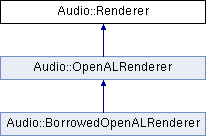|
Vegastrike 0.5.1 rc1
1.0
Original sources for Vegastrike Evolved
|
|
Vegastrike 0.5.1 rc1
1.0
Original sources for Vegastrike Evolved
|
#include <Renderer.h>

Public Member Functions | |
| Renderer () throw (Exception) | |
| virtual | ~Renderer () |
| virtual SharedPtr< Sound > | getSound (const std::string &name, VSFileSystem::VSFileType type=VSFileSystem::UnknownFile, bool streaming=false)=0 throw (Exception) |
| virtual bool | owns (SharedPtr< Sound > sound)=0 |
| virtual void | attach (SharedPtr< Source > source)=0 throw (Exception) |
| virtual void | attach (SharedPtr< Listener > listener)=0 throw (Exception) |
| virtual void | detach (SharedPtr< Source > source)=0 throw () |
| virtual void | detach (SharedPtr< Listener > listener)=0 throw () |
| virtual void | setMeterDistance (Scalar distance) throw () |
| virtual Scalar | getMeterDistance () const throw () |
| virtual void | setDopplerFactor (Scalar factor) throw () |
| virtual Scalar | getDopplerFactor () const throw () |
| virtual void | setOutputFormat (const Format &format) throw (Exception) |
| virtual const Format & | getOutputFormat () const throw () |
| virtual void | beginTransaction () throw (Exception) |
| virtual void | commitTransaction () throw (Exception) |
Definition at line 36 of file Renderer.h.
| Audio::Renderer::Renderer | ( | ) | ||
| throw | ( | Exception | ||
| ) | ||||
Initialize the renderer with default or config-driven settings.
Definition at line 10 of file Renderer.cpp.
|
virtual |
Definition at line 14 of file Renderer.cpp.
Attach a source to this renderer
Implemented in Audio::OpenALRenderer.
|
pure virtual | ||||||||||||||
Attach a listener to this renderer
Implemented in Audio::OpenALRenderer.
|
virtual | |||||||||||||
Begins a transaction
Reimplemented in Audio::OpenALRenderer.
Definition at line 54 of file Renderer.cpp.
|
virtual | |||||||||||||
Detach a source from this renderer.
Implemented in Audio::OpenALRenderer.
Detach a listener from this renderer.
Implemented in Audio::OpenALRenderer.
|
virtual | |||||||||||||
Gets how much the doppler effect will be accounted for.
Definition at line 36 of file Renderer.cpp.
|
virtual | |||||||||||||
Gets the distance in world units that represents one meter.
Definition at line 24 of file Renderer.cpp.
|
virtual | |||||||||||||
Gets the distance in world units that represents one meter.
Definition at line 48 of file Renderer.cpp.
|
pure virtual | ||||||||||||||||||||||||
Create a sound, from the stream of the specified name.
| name | The path of the soundfile. |
| type | The file type (needed by the filesystem). |
| straeming | If true, requests for a streaming sound - one that is not loaded to memory for playback, but rather read on-demand during playback. |
Implemented in Audio::OpenALRenderer.
Return whether the specified sound has been created using this renderer or not
Implemented in Audio::OpenALRenderer.
|
virtual | ||||||||||||||
Sets how much the doppler effect will be accounted for.
Reimplemented in Audio::OpenALRenderer.
Definition at line 30 of file Renderer.cpp.
Referenced by Audio::OpenALRenderer::setDopplerFactor().
|
virtual | ||||||||||||||
Sets the distance in world units that represents one meter.
Reimplemented in Audio::OpenALRenderer.
Definition at line 18 of file Renderer.cpp.
Referenced by Audio::OpenALRenderer::setMeterDistance().
Sets the (preferred) output format.
Reimplemented in Audio::OpenALRenderer, and Audio::BorrowedOpenALRenderer.
Definition at line 42 of file Renderer.cpp.
Referenced by Audio::BorrowedOpenALRenderer::setOutputFormat(), and Audio::OpenALRenderer::setOutputFormat().